- Quinebaug Valley Community College (QVCC) is a public two-year college, supported by the State of Connecticut and governed by the Board of Trustees of Community-Technical Colleges. It is accredited by the Board of Governors for Higher Education and by the New England Association of Schools and Colleges. One of twelve institutions in the community-technical college system, QVCC�s service region is Windham County in the northeastern corner of the state. QVCC has developed comprehensive degree and certificate programs to be responsive to the needs of the residents of the area it serves.
School Highlights
Quinebaug Valley Community College serves 1,118 students (36% of students are full-time).
The college's student:teacher ratio of 10:1 is lower than the state community college average of 26:1.
Minority enrollment is 97% of the student body (majority Black), which is more than the state average of 72%.
Quick Stats (2025)
- Enrollment: 1,118 students
- In-state tuition: $3,866
- Out-state tuition: $11,558
- Student:teacher ratio: 10:1
- Minority enrollment: 97%
- Source: Integrated Postsecondary Education Data System (IPEDS)
Top Rankings
Quinebaug Valley Community College ranks among the top 20% of public schools in Connecticut for:
Category
Attribute
Affordability
School Overview
The teacher population of 115 teachers has stayed relatively flat over five years.
Quinebaug Valley Community College
(CT) Community College Avg.
Carnegie Classification
Associate's Colleges: Mixed Transfer/Career & Technical-High Traditional
Associates Colleges
Institution Level
At least 2 but less than 4 years
At least 2 but less than 4 years
Institution Control
Public
Public
Total Faculty
115 staff
154 staff
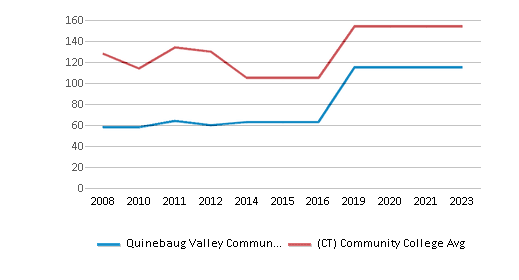
School Calendar
Student Body
The student population of Quinebaug Valley Community College has declined by 13% over five years.
The student:teacher ratio of 10:1 has stayed the same over five years.
The Quinebaug Valley Community College diversity score of 0.39 is less than the state average of 0.81. The school's diversity has stayed relatively flat over five years.
Total Enrollment
1,118 students
1,220 students
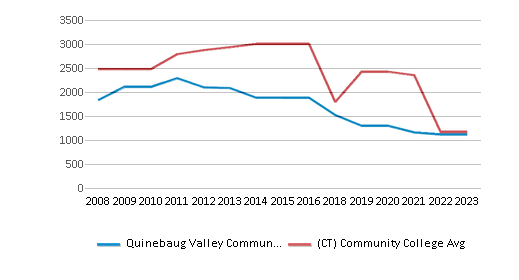
Student : Teacher Ratio
10:1
26:1
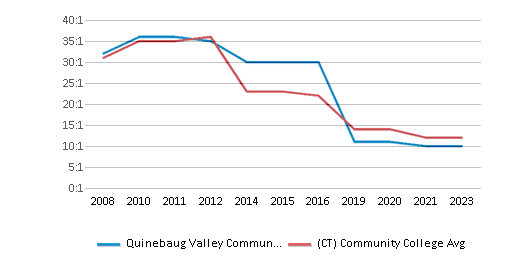
# Full-Time Students
405 students
770 students
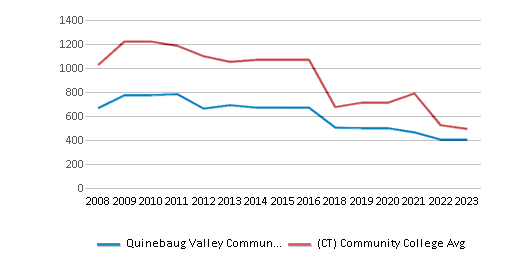
# Part-Time Students
713 students
713 students
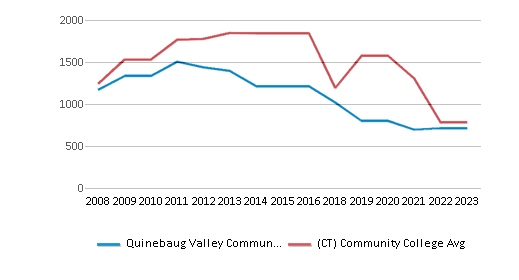
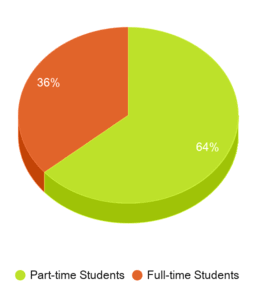
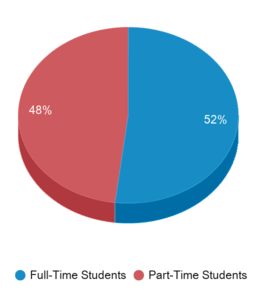
# Enrollment Undergraduate
779 students
352 students
# Full-Time Undergraduate Students
405 students
770 students
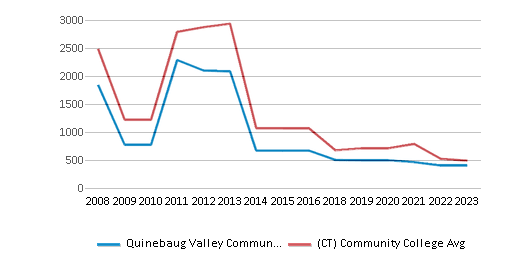
# Full-Time Graduate Students
n/a
27 students
# Part-Time Undergraduate Students
713 students
713 students
# Part-Time Graduate Students
n/a
144 students
Total Dormitory Capacity
n/a
550 students
% American Indian/Alaskan
3%
2%
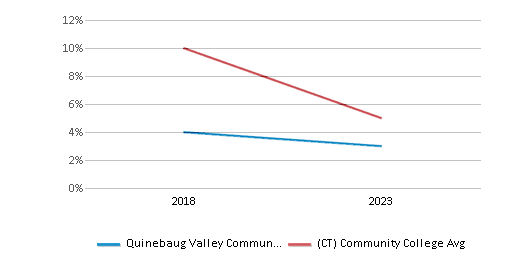
% Asian
3%
9%
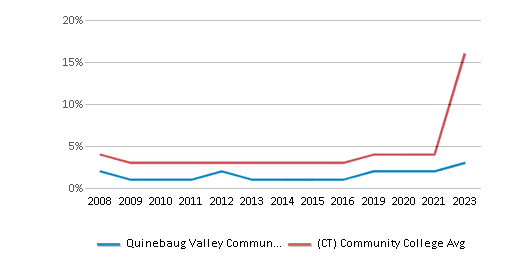
% Hispanic
n/a
17%
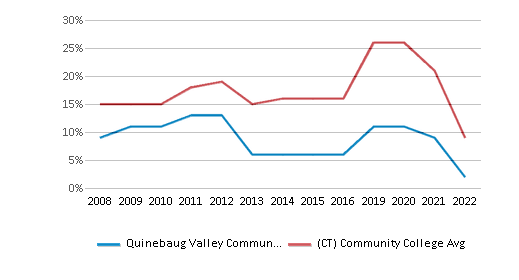
% Black
12%
20%
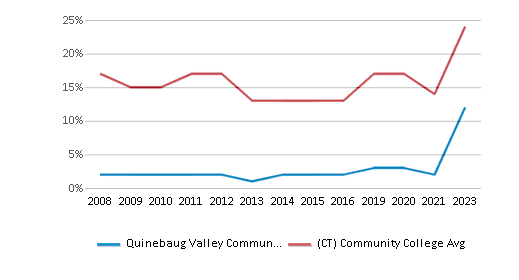
% White
3%
28%
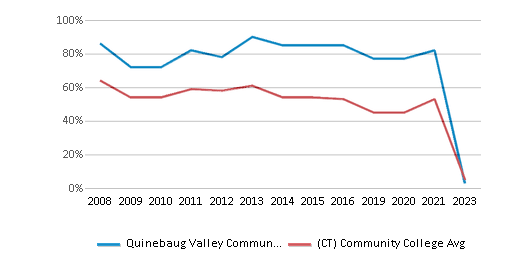
% Hawaiian
77%
17%
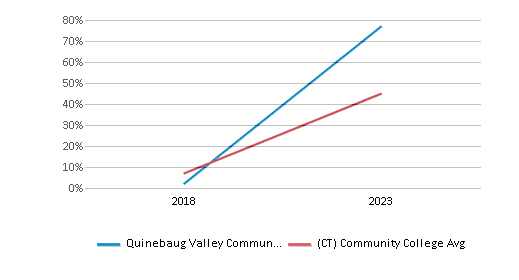
% Two or more races
2%
3%
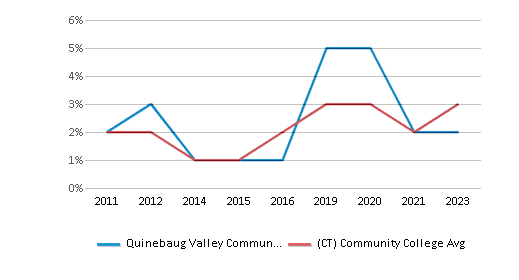
% Non Resident races
n/a
2%
% Unknown races
n/a
2%
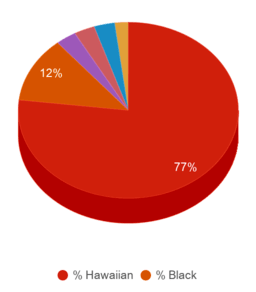
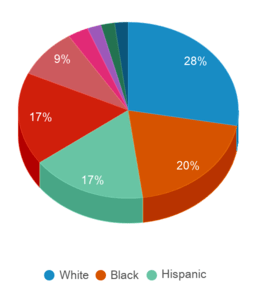
Diversity Score
0.39
0.81
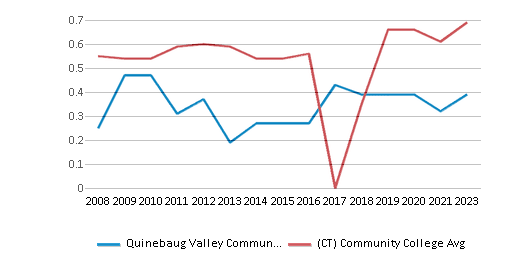
College Completion Rate (Students who graduate in less than 4 years)
0.1962%
0.1962%
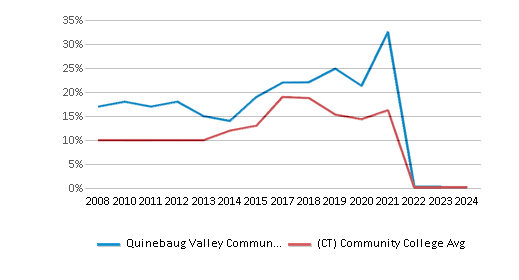
College Completion Rate (Students who graduate in 4 years or more than 4 years)
n/a
0.5992%
Average Graduate Earnings (10 Years)
$30,100
$34,800
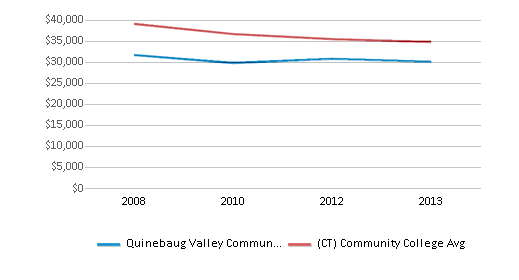
Tuition and Acceptance Rate
The public in-state tuition of $3,866 is less than the state average of $5,329. The in-state tuition has declined by 12% over four years.
The public out-state tuition of $11,558 is less than the state average of $15,711. The out-state tuition has declined by 12% over four years.
In-State Tuition Fees
$3,866
$5,329
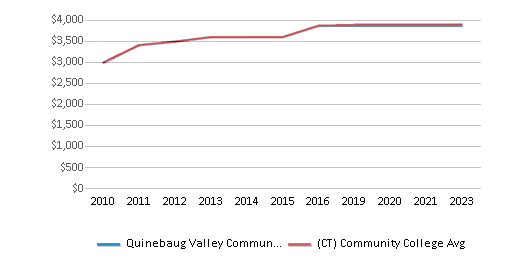
Out-State Tuition Fees
$11,558
$15,711
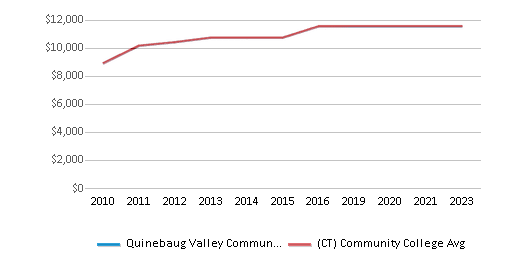
% Students Receiving Some Financial Aid
92%
88%
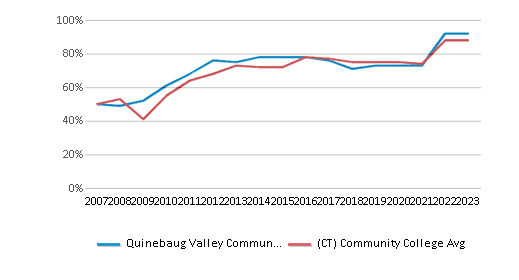
Median Debt for Graduates
n/a
$8,000
Median Debt for Dropouts
n/a
$4,356
Acceptance Rate
n/a
78%
SAT Reading
n/a
500
SAT Math
n/a
510
ACT Composite
n/a
23
Source: 2024 (or latest year available) Integrated Postsecondary Education Data System (IPEDS) , School Administrators
School Notes
- Quinebaug Valley Community College (QVCC) is a public two-year college, supported by the State of Connecticut and governed by the Board of Trustees of Community-Technical Colleges. It is accredited by the Board of Governors for Higher Education and by the New England Association of Schools and Colleges. One of twelve institutions in the community-technical college system, QVCC's service region is Windham County in the northeastern corner of the state. QVCC has developed comprehensive degree and certificate programs to be responsive to the needs of the residents of the area it serves. QVCC prides itself on offering academic programs of high quality. Its graduates transfer easily to many four-year colleges and universities, and its occupational programs are highly regarded by area employers. QVCC also has a strong and growing program of continuing education and community service activities. The College also functions to a large extent as a community center, opening its library and many events to the general public. It presents lectures, art exhibits, concerts, and occasional dramatic productions. Training for local business is also a major activity. QVCC has established itself as a viable and significant educational institution in and for the community it serves. The Center for Community and Professional Learning, which serves lifelong learners from childhood through retirement, works in partnership with college and community constituencies to develop and provide innovative program and service initiatives that respond to community learning needs and support local economic development efforts. Programs and services include credit-free courses, pre-and post-associate degree level job-focused training options, customized training services, support for activities and groups that promote social and cultural awareness, and activities and services that assist entrepreneurs and employers. The associate degree represents college-level work requiring a minimum of 60 and a maximum of 68 semester hours of credit. Quinebaug Valley Community College grants the degrees of Associate in Arts, and Associate in Science.
Frequently Asked Questions
How much does Quinebaug Valley Community College cost?
Quinebaug Valley Community College's tuition is approximately $3,866 for In-State students and $11,558 for Out-State students.
What is Quinebaug Valley Community College's ranking?
Quinebaug Valley Community College ranks among the top 20% of community college in Connecticut for: Least expensive tuition and Average community college minority breakdown.
Recent Articles

Obtaining Your Bachelor's Degree at a Community College
Explore the evolving landscape of community colleges offering bachelor's degrees, addressing affordability, accessibility, and workforce needs.

A to Z of Community College Certificates and Courses
From business and healthcare to technology and skilled trades, the article showcases the breadth of options available to students seeking to enhance their knowledge, develop new skills, or pursue career advancement.

What is a Community College?
This comprehensive guide explains what a community college is, its history, and its role in higher education. It covers the types of programs offered, differences from four-year colleges, benefits of attending, and important considerations for prospective students, providing valuable insights for those exploring educational options.











